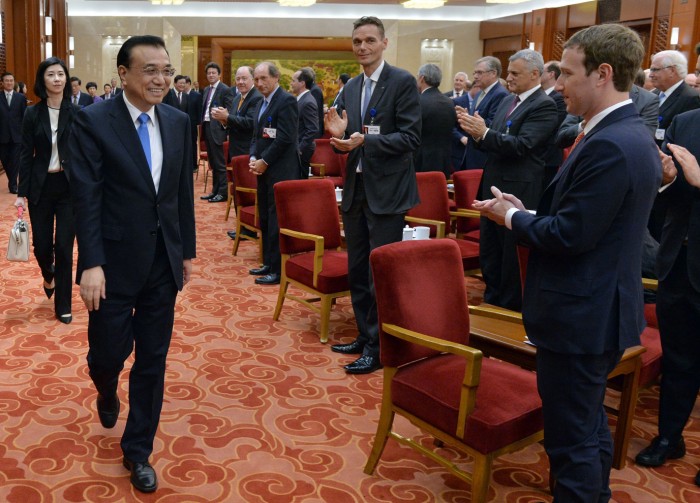Facebook’s Content Blocking Sends Some Very Mixed Messages
Facebook has reportedly built a new censorship tool as part of its bid to succeed in China—a revelation that’s hard to square with its response to its fake-news problem.
Many Internet giants have tried to crack China in the past. But it typically requires a softening of principles, which was perhaps best demonstrated in 2006, when members of Congress in the U.S. accused Yahoo, Google, and Microsoft of “sickening collaboration” with the Chinese government over their decision to censor content.
Mark Zuckerberg, though, has made no secret of the fact that he aims to succeed where others failed. And now, according to the New York Times, the social network has built systems that can be used to stop certain content from appearing in news feeds. Sources tell the newspaper that the software was developed specifically to help Facebook “get into China.”

According to the report, the censorship wouldn’t be directly performed by Facebook itself. Instead, the software would allow a third party to monitor content being posted to the social network, then stamp out items as it saw fit. The initiative has apparently proved divisive at Facebook. Some employees are said to have quit over its development.
Those may not be the only qualms to be aired. Critics will no doubt compare this to the ongoing issue of fake news that’s plaguing the social network in the U.S. If the company might be prepared to censor Chinese content, why not block misinformation, too?
The problem, of course, is making the call: deciding what's true and false can be difficult. As Eugene Kiely, the director of FactCheck.org, explained to Bloomberg: “There’s bad information out there that’s not necessarily fake. It’s never as clear-cut as you think.” Mark Zuckerberg is very much aware of that issue. Indeed, he has publicly stated that he wants the social network and its staff to “be extremely cautious about becoming arbiters of truth.”
That’s probably why Facebook’s only solution to the fake-news issue so far has been to halt the provision of ads to sites that peddle false information. Zuckerberg has promised that more will be done, but we shouldn’t expect it in a hurry—especially given his warning that the issues are “complex, both technically and philosophically.”
The censorship tool developed for China seems to neatly sidestep that weight of responsibility, instead passing the reins over to a third party. That may be enough for Zuckerberg to convince himself that Facebook isn’t acting unethically by censoring content. But this man is in charge of one of the primary conduits through which over one billion people receive news and information. Passing the buck is no longer an option, even if it does help you make it in China.
(Read more: The New York Times, Bloomberg, “Regardless of Its Influence on the Election, Facebook Needs to Change,” “Facebook’s Fake-News Ad Ban Is Not Enough,” “Mark Zuckerberg’s Long March to China”)
Keep Reading
Most Popular
How scientists traced a mysterious covid case back to six toilets
When wastewater surveillance turns into a hunt for a single infected individual, the ethics get tricky.
The problem with plug-in hybrids? Their drivers.
Plug-in hybrids are often sold as a transition to EVs, but new data from Europe shows we’re still underestimating the emissions they produce.
What’s next for generative video
OpenAI's Sora has raised the bar for AI moviemaking. Here are four things to bear in mind as we wrap our heads around what's coming.
Stay connected
Get the latest updates from
MIT Technology Review
Discover special offers, top stories, upcoming events, and more.